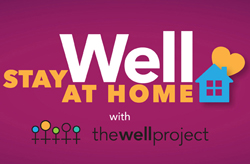
Lea esta hoja informativa en español
Table of Contents
- Stress and HIV
- Signs of Stress
- Common Causes of Stress
- How to Reduce Stress
- Depression
- Other Tips for Reducing or Coping with Stress
Stress and HIV
Everyone deals with a certain amount of stress every day. But if you are a woman living with HIV, stress can become overwhelming. Long periods of high stress can damage your immune system and cause physical and emotional illnesses. Research has shown that stress can speed up the progression of HIV.
In the US, studies have shown that women living with HIV are more likely to have post-traumatic stress disorder (PTSD) and to have survived domestic violence than women who are not living with HIV. Women living with HIV who experienced recent trauma were also more likely to stop adhering to their HIV treatment and to have higher viral loads than women living with HIV who did not experience trauma.
Signs of Stress
The effects of stress can show up in many ways and are different for everyone. You can manage stress better if you recognize the symptoms. Below is a list of common symptoms. It is important to tell your healthcare provider if you experience any of these symptoms, since some may be caused by something other than stress (e.g., side effects of medications or HIV itself).
Physical Symptoms
- Allergies
- Lack of appetite or overeating
- Back pain
- High blood pressure
- Shortness of breath
- Chest pain
- Clammy hands
- More colds than normal
- Constipation and/or diarrhea
- Dizziness
- Fatigue
- Headaches
- Racing heartbeat
- Muscle tension
- Nausea
- Rashes
- Restlessness
- Sleeping problems such as nightmares
- Stomach aches
Emotional Symptoms
- Uncontrollable anger, irritation, or being easily upset
- Anxiety
- Loneliness
- Nervousness
- Feeling powerless
- Feeling rejected
- Feeling trapped
- Feeling unhappy for no reason
- Worrying frequently
Behavioral Symptoms
- Increasing use of alcohol, tobacco or other drugs
- Not tending to your physical appearance
- Arguing with friends or family
- Avoiding tasks and responsibilities, such as being late to work
- Difficulty concentrating
- Crying easily (and often for no apparent reason)
- Being late to work
- Eating too much or not enough
- Snapping at people
- Watching more TV than usual
- Withdrawing from family and friends
- Difficulty making decisions
- Denial of a problem
Click above to view or download this fact sheet as a PDF slide presentation
Common Causes of Stress
What are some of the things that can make you feel stressed – or be signs of stress?
- Personal and family health problems including access to healthcare
- New HIV diagnosis and managing an HIV drug regimen
- Financial difficulties including housing concerns, food insecurity, etc.
- Children and childcare issues
- Substance use (also often used to manage or deal with stress)
- Partner, family member or other loved one’s substance use
- Stigma and discrimination
- Social isolation (disconnecting from social life and from other people)
- Issues with disclosure (telling others you are living with HIV)
- Focusing on death and dying
- Chronic impatience
- Grief
- Lack of purpose and goals
- Lack of self-assertiveness
- Lack of support
- Poor coping skills
- Poor eating habits and nutrition
- Sleep disturbances
- Insufficient exercise
- Limited ability to care for yourself when sick
- Limited understanding of HIV-related health issues
- Poor relationship with your healthcare provider
- Domestic or intimate partner abuse
For more information about stress, trauma, and mental well-being, please see our fact sheet Mental and Behavioral Health, Women, and HIV.
How to Reduce Stress
Stress often results from feeling that things are out of control. While you may not be able to change what stresses you, it can be very helpful to begin to accept that you are human (not "superwoman"), understand that you need help, and find the resources that can help. That way, even if you have a lot on your plate, you will feel better able to cope with it. Make a list of the following:
- Areas in which you feel overwhelmed and need help
- Who or what can help
- How to get available services
Some cities publish books or online lists of resources and agencies that are available to the public. Some towns have an information and referral service that can help. Often a caseworker or advocate at an HIV/AIDS service organization can help you sort through the information.
What kinds of free or low-cost services can help with stress? It depends on where you live, but some of them include:
- Medical services
- Counseling and psychological help
- Childcare
- Taxi rides
- Bus passes
- Acupuncture
- Yoga classes
- Massage
- Support groups
- Drug and alcohol programs
- Recovery-related groups such as Alcoholics Anonymous, Narcotics Anonymous, and Al-Anon
- Dating services for people living with HIV
- Free computers
- Employment services
- Nutrition counseling
- Legal aid
Apply to as many programs, agencies, or services as you need. There is no reason to feel guilty about accepting money or services. That is why they are there. If there are limits on the number of services you can receive from a certain agency, choose the most important or necessary services first. It may take some time to fill out all the paperwork, but it will be worth it in the long run.
It is important not to forget about friends and family. If someone offers help or asks you what you would like for a holiday or your birthday, speak up! If what you really need is someone to watch the kids for a weekend or help paying your rent, ask. The worst that can happen is that they will say no – and they might say yes.
Another key to dealing with stress is to learn the value of self-care. Sometimes women consider it "selfish" to take time for self-care activities such as exercise, getting a massage, or talking with friends when there are so many other important things to do. But if you become overwhelmed by stress, who will tend to your responsibilities? Many women living with HIV are too busy caring for kids or partners to notice that they are "burning out" mentally, physically, or emotionally. Try to find a balance between giving and receiving help. We also encourage you to visit A Girl Like Me, our online support community for women living with HIV.
Stay Well at Home with The Well Project: Our bi-weekly wellness series, which launched in 2020 in the earliest days of the COVID-19 pandemic, featured video/chat sessions with women living with HIV teaching techniques, tips, tools, and approaches to self-care and stress management.
Depression
Long periods of high stress can lead to depression. Sleep problems, changes in appetite, low sex drive, decreased energy, loss of interest in activities, feelings of guilt or worthlessness, difficulty concentrating, and thoughts of killing yourself are all symptoms of depression. In people living with HIV, depression is often not diagnosed or treated, because many of its symptoms are similar to those of HIV drugs or HIV itself.
Important: If you are thinking of hurting yourself or committing suicide, please tell someone immediately. In the US, you can call or text 988, or call 1-800-SUICIDE (1-800-784-2433) or 1-800-273-TALK (1-800-273-8255). To find a suicide hotline near you, try http://www.suicide.org/suicide-hotlines.html; this website lists US hotlines by state as well as hotlines by country (click on the "International Hotlines" link at the top of the main page).
Many people living with HIV experience depression at some point in time. Women are more likely than men to become depressed, regardless of their HIV status. Addressing your mental health needs is important, including depression. Undiagnosed and/or untreated depression can be a major reason why people living with HIV do not take their HIV drugs regularly (are not adhering to their drug regimen) and can lead to infections, poor health, and a low quality of life. Depression can be treated through therapy (individual or group), medications, or complementary therapies.
It is important to talk to your healthcare provider about depression, especially if you are experiencing symptoms or having trouble sticking to your HIV drug regimen. If you are suffering from symptoms of depression, ask for a referral to see a mental healthcare provider. When we experience physical problems, it is best to get treatment. If someone breaks a leg, we encourage them to see a healthcare provider to get the leg checked and treated so it heals properly. Similarly, when we experience emotional difficulty, there is no need to suffer when effective treatments are available. For more information on how to treat and manage depression, please see our fact sheet Depression, Women and HIV.
Other Tips for Reducing or Coping with Stress
Everyone has different things that cause stress in their lives, and everyone finds different methods effective in dealing with them. Look for stress-reduction or coping techniques that work for you. Here are some ideas:
- Talk about it: a friend or family member may help you sort out your feelings and get a new perspective on problems
- Laugh about it: laughter can improve your mood and your immune system – seriously!
- Join a support group or visit A Girl Like Me, our online support community for women living with HIV
- Get help: talk to your healthcare provider or request a referral to a mental health expert
- Get regular physical activity and plenty of rest
- Change your own outlook and actions, rather than trying to change those of others
- Keep a journal
- Practice assertive communication in which you learn how to say no to things you do not want to do and yes to things you do want to do
- Get enough sleep: most people need about six to nine hours of sleep at regular times
- Take a break and treat yourself
- Practice hypnosis, biofeedback, or get a massage to relieve tension
- Listen to music
- Try relaxation techniques such as meditation, deep breathing, or visualization. Studies suggest that mindfulness meditation may prevent CD4 cells from decreasing when a person living with HIV is under stress.
- Eat healthfully: fuel your body with good foods and hydration (drinking enough clear liquids like water) that will help it remain strong; for more information, see our fact sheet on Nutrition and HIV
- Remind yourself of your accomplishments
- Try to find the positive aspects of change – how is what is happening now helping you to learn, change, or grow?
- Try to look back on a crisis as a learning opportunity
Stress is not in your imagination – it is a real thing that can have real effects on your health and well-being. It is important to talk with your healthcare provider about your stress level so that you can take steps to stay as healthy as possible. Despite what some people may say, it is not a sign of weakness to care for yourself, mentally or physically. Caring for yourself is not selfish; in fact, caring for yourself and finding ways to manage your stress may be exactly what helps you to stay healthy and care for the important people in your life.


